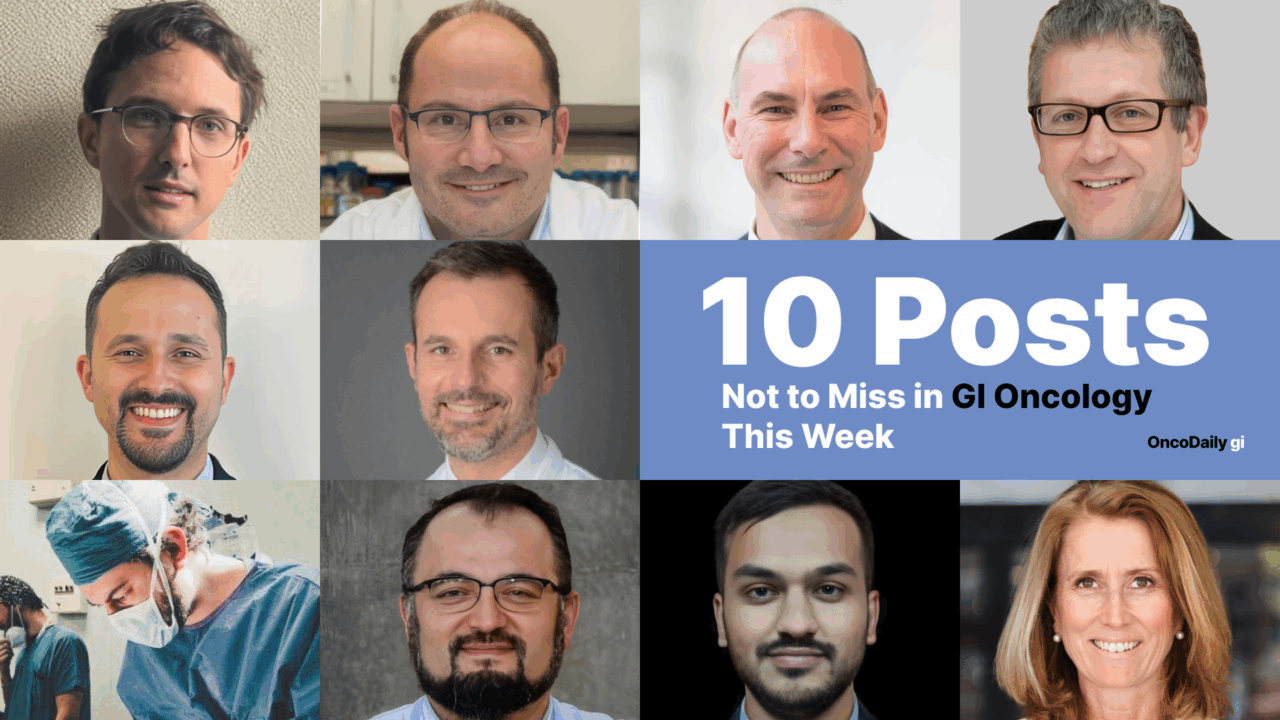At OncoDaily GI, we deliver the latest breakthroughs, clinical updates, and research insights driving progress in GI oncology. This week’s roundup encompasses colorectal, gastric, biliary, and hepatobiliary cancers, with a focus on advances ranging from epidemiology and biomarker discovery to precision therapeutics and surgical innovation.
Highlights include new data on early-onset colorectal and pancreatic cancer trends, biomarker-guided immunotherapy approaches in MSS CRC, RNF43 as a predictor of exceptional response in BRAF-mutant CRC, and the landmark ALASCCA trial demonstrating recurrence reduction with low-dose aspirin in PI3K-altered CRC. Additional updates feature AI-enabled surgical risk stratification, nationwide outcomes supporting trisectionectomy for perihilar cholangiocarcinoma, bidirectional intraperitoneal chemotherapy for gastric cancer peritoneal metastases, a meta-analysis of capecitabine in biliary tract cancer, and fresh evidence confirming the prognostic and clinical utility of cfDNA in BTCs.
Stay current with perspectives from leading GI oncologists, surgeon-scientists, and translational researchers shaping the future of precision gastrointestinal cancer care worldwide.
Eric Van Cutsem, MD, PhD (Professor of Medicine, Digestive Oncology, University Hospital Gasthuisberg, Leuven, Belgium)
“Indeed, as communicated already by my colleagues — fantastic Inaugural Scientific Symposium of the Hong Kong Society of Digestive Oncology along with Brigitte Ma, Heinz Lenz, and Kei Muro. It was a great honor to be part of this amazing group of experts.
Under the leadership of Dr. Lam (President) and Dr. Rui (Vice President), the meeting brought together GI experts from the Chinese University of Hong Kong, the University of Hong Kong, and community oncologists to share the latest and greatest in GI oncology.
Congratulations to a very successful inaugural symposium.
I was also very happy with all the interactions with lovely colleagues at Prince of Wales Hospital and in the vibrant city of Hong Kong.”
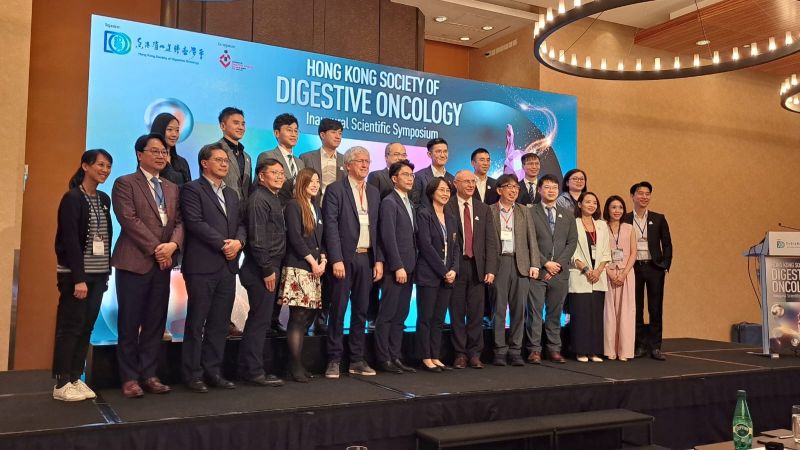
Florian Lordick (Oncologist, Professor of Medicine at University of Leipzig, Head of Medical Oncology, Director of the Comprehensive Cancer Center Central Germany)
“New research highlights shifting trends in early-onset gastrointestinal (GI) cancers across Europe and the Mediterranean.
A multi-country study analyzing cancer registry data (ages 15–49) reveals:
Colorectal cancer incidence is rising in most countries for both sexes.
Pancreatic cancer is increasing, particularly among young women.
Gastric and esophageal cancers remain largely stable.
These findings emphasize the growing importance of prevention, early detection, and further research into lifestyle, environmental, and sex-related factors driving these trends.”
Read the full open-access study
Antoine Italiano (Professor of Medicine, Head of Early Phase Trials Unit, Institut Bergonié, Head of Precision Medicine, Gustave Roussy)
“𝐌𝐒𝐒 𝐂𝐑𝐂 = 𝐢𝐦𝐦𝐮𝐧𝐨𝐭𝐡𝐞𝐫𝐚𝐩𝐲-𝐫𝐞𝐬𝐢𝐬𝐭𝐚𝐧𝐭” 𝐢𝐬 𝐭𝐨𝐨 𝐬𝐢𝐦𝐩𝐥𝐞. Two recent signals show that, with smart selection and the right combinations, ICI can help the right MSS CRC patients.
𝐆𝐞𝐧𝐨𝐭𝐲𝐩𝐞-𝐚𝐧𝐜𝐡𝐨𝐫𝐞𝐝 𝐜𝐨𝐦𝐛𝐨
In BRAFV600E MSS mCRC, the encorafenib+cetuximab+nivolumab triplet delivered durable activity, with tumor/plasma RNA showing IFNγ/immune activation in responders and complement activation in non-responders—biology matters.
𝐅𝐢𝐫𝐬𝐭-𝐥𝐢𝐧𝐞, 𝐜𝐡𝐞𝐦𝐨-𝐟𝐫𝐞𝐞 𝐈𝐂𝐈+𝐚𝐧𝐭𝐢-𝐚𝐧𝐠𝐢𝐨𝐠𝐞𝐧𝐢𝐜Sintilimab+anlotinib in treatment-naïve pMMR/MSS mCRC achieved ORR ~48% and mPFS ~8.6 mo. Responders had richer CD8⁺PD-1⁺ T cells, CD20⁺ B cells (hinting at B-cell/TLS biology despite limited power), and PD-L1⁺CD68⁺ macrophages, with spatial proximity of PD-1⁺ cells and CD68⁺CD163⁺ macrophages to tumor (<30 µm) associated with benefit.
These results echo those from a study conducted by our team investigating ICI plus anti-angiogenic therapy in later-line MSS CRC with on-treatment readouts (Cousin et al CCR 2021). In the REGOMUNE trial, baseline CD163⁺ TAM density was associated with PFS and OS, which directly led to the design of a new cohort selecting patients based on macrophage infiltration (readout pending…)𝐓𝐡𝐞 𝐭𝐡𝐫𝐨𝐮𝐠𝐡-𝐥𝐢𝐧𝐞: 𝐌𝐒𝐒 𝐂𝐑𝐂 𝐢𝐬𝐧’𝐭 𝐮𝐧𝐢𝐟𝐨𝐫𝐦𝐥𝐲 𝐫𝐞𝐟𝐫𝐚𝐜𝐭𝐨𝐫𝐲—𝐢𝐭’𝐬 𝐡𝐞𝐭𝐞𝐫𝐨𝐠𝐞𝐧𝐞𝐨𝐮𝐬. When we (i) match combinations to tumor biology (e.g., BRAF+EGFR+PD-1), and/or (ii) use TME-grounded selection (CD8 infiltration dynamics, B-cell/TLS signals, macrophage burden/spatial metrics), immunotherapy can work. Next steps are clear: prospective biomarker-driven designs that pre-specify these axes up front”
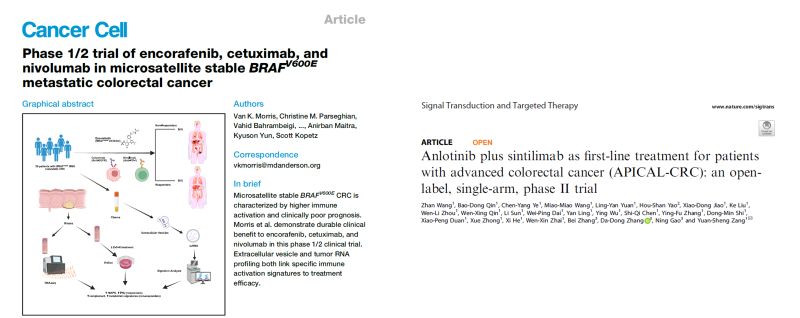
Rodrigo Toledo, PhD, MBA (Molecular Oncologist, Vall d’Hebron Institute of Oncology, IESE Business School)
“Big News ! Biomarker validation in Colorectal Cancer Research
BRAF-mutated colorectal cancer is among the most aggressive forms of GI malignancy. Anti-BRAF/EGFR therapy can be life-changing — but not all patients benefit equally. Our team discovered that RNF43 mutations act as a biomarker of exceptional response in these tumors. (Elez E et al., Nature Medicine, 2022)
Independent validation in Real World Data.
Our results were validated in independent cohorts from Spain, Italy, USA, China, and very recently UK.Take-home message:
RNF43 mutations pinpoint the “super responders” among patients with BRAF-mutated colorectal cancer — helping us move toward a truly personalized treatment strategy.This is another step toward tailoring therapies so that the right patients get the right treatment at the right time. Grateful to our collaborators and the patients who make this research possible.”
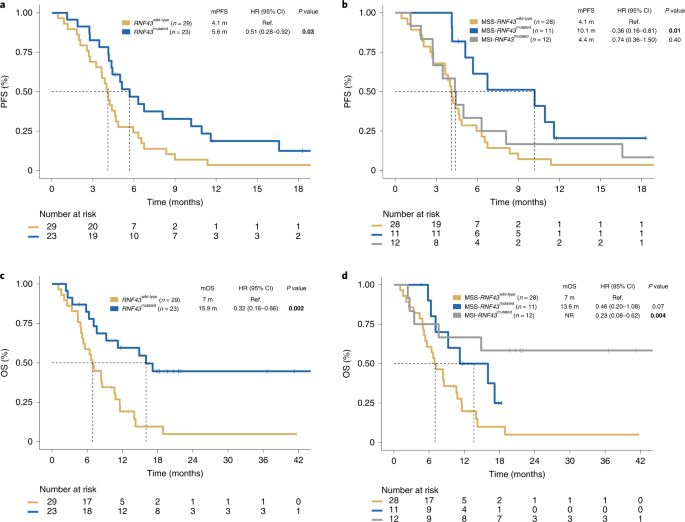
Ismail Gogenur (Professor and Senior Consultant, Department of Surgery, Zealand University Hospital, University of Copenhagen)
“I am excited to share this new study from our team at Center for Surgical Science (CSS) in Nature Medicine published today.
Our study demonstrates how AI augmented decision support can be used to make surgery related care more individualized.
What we found: AI can help us identify which patients are at higher risk before surgery — giving us the chance to optimize their care in relation to colorectal cancer surgery. When we used this approach, patients experienced fewer complications and shorter hospital stays and it was cost effective.Why it matters: Every patient deserves the best possible preparation and care in relation to surgery. By bringing AI into daily practice, we can support caregivers in making the right decisions at the right time — improving outcomes for patients while also easing pressure on the healthcare system.
This is just the beginning! Our work shows that AI isn’t just a research idea or potential for improvement anymore — it’s a practical tool ready to transform healthcare at scale! We need to think implementation at the very beginning of the innovation journey. We need to have a multidisiciplinary approach including datascientist with deep insights in model building that can bridge the important gap between clinical insights on one side and AI and digital possibilities on the other side – all for the benefit of our patients!!
Extremely gratefull for the collaboration with all our multidisciplinary collaboratoprs at Zeland University Hospital, our world class colorectal surgical team and the amazing scientists at Center for Surgical Science (CSS)
We sincerely hope that this approach will be scaled to other cancer areas in Denmark and that we will succeed in our next generation tools for improving cancer surgery.”
Anna Martling, MD, PhD (Professor of Surgery, Karolinska Institutet)
“Today marks an important milestone for colorectal cancer research. Our study ALASCCA, now published in The New England Journal of Medicine, is the first randomized biomarker-driven trial to demonstrate that low-dose aspirin significantly reduces recurrence in patients with colorectal cancer harboring alterations in the PI3K signaling pathway.
This finding could change clinical practice for more than one-third of all CRC patients — using a safe, inexpensive, and widely available drug.
This achievement was made possible thanks to:
The patients who generously participated
The ALASCCA steering group and study team for their tireless work
Clinical Genomics at SciLifeLab for state-of-the-art genomic profiling
The 33 Nordic centers and their outstanding local PIs for making this a true collaborative effort
The results have already gained international attention. The next steps include implementation, extended follow-up, and new translational studies through the ALASCCA Research Platform — bringing precision medicine closer to routine CRC care.”
Erman Akkus MD (Medical Oncologist, Ankara University)
“cfDNA in biliary tract cancers
JCOPO_ASCO
OncoKB level 1/2 alterations in 25% of patients
High tissue concordance
May be prognostic
Another data point reinforcing the utility of ctDNA in BTCs.”

Read more about The Role of cfDNA in Biliary Tract Cancer: Clinical and Prognostic Perspectives on OncoDaily.
Stylianos Tzedakis ( Hepatobiliary, Digestive, and Endocrine Surgeon, Hôpital Cochin – AP-HP; University of Paris)
“We are pleased to share our nationwide, multicenter study on surgical strategy for Bismuth–Corlette type II–III perihilar cholangiocarcinoma, conducted across thirteen French expert centers and presented in the prestigious European Surgical Association meeting in Geneva this year – before henri bismuth himself one of this founders. We compared right or left trisectionectomy (H145678-B or H123458-B) with right or left extended hemihepatectomy (H15678-B or H1234-B)
National multicenter cohort (2010–2020) including 443 patients
Methods: propensity score–based weighting (IPTW) and random-effects Cox regressions
Outcomes: overall survival, disease-free survival, margin-negative (R0) resection rate, and postoperative outcomes using International Study Group of Liver Surgery definitions and the Clavien–Dindo classification
Key finding:
When technically feasible and after rigorous preoperative optimization, right or left trisectionectomy was associated with higher margin-negative resection rates and improved long-term oncologic outcomes compared with right or left extended hemihepatectomy—while carrying a higher risk of postoperative liver failure, underscoring the need for careful patient selection and liver preparation/optimizationWhy it matters:
Perihilar cholangiocarcinoma is a rare disease, especially in Western countries. This study shows that collaborative, nationwide work across expert centers can generate robust evidence to guide complex surgical decisions and improve patient care.Clinical takeaways:
-> When feasible consider right or left trisectionectomy for localized Bismuth–Corlette type II–III perihilar cholangiocarcinoma
-> Rigorous preoperative optimization to mitigate the risk of postoperative liver failure”
Syed Kashif Ali (Analyst II – HEOR/RWE, SLR & MA, HTA, Market Access, Pharmacovigilance, Evidence Synthesis)
“Excited to share that our article has been published in the Journal of Oncology Pharmacy Practice (Sage Journals)
Title: Efficacy and safety of capecitabine therapy in patients with biliary tract cancer: A systematic review and meta-analysis
This publication reflects the dedication and collaboration of our team, and I am honored to have worked closely with my PhD seniors, Christy Thomas and Dr. MAHESH RATHOD, sharing equal authorship in this journey.
A special note of thanks to my guide and mentor, Prof. Krishna Undela, for his invaluable guidance, encouragement, and constant support throughout the process.
Looking forward to more collaborations, learning opportunities, and contributing further to this field of research”
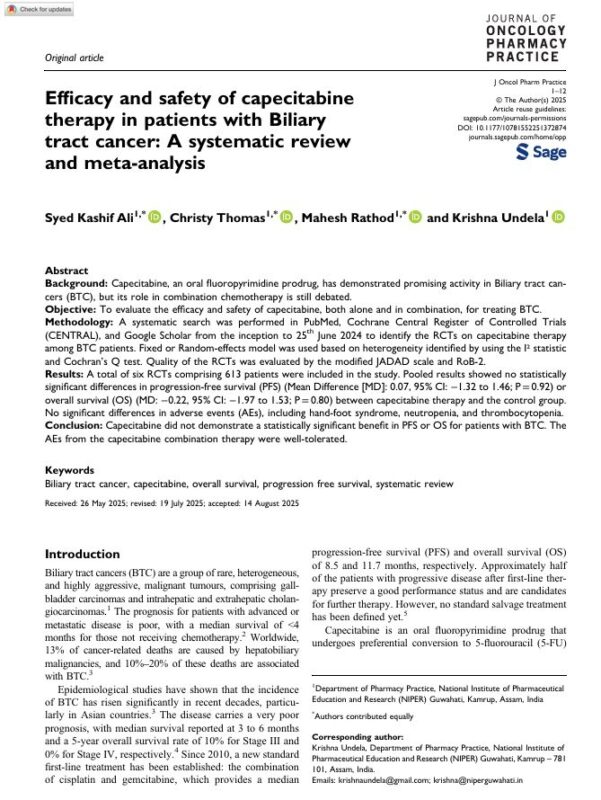
Daniele Scuto (Surgeon, Sapienza University of Rome, Rome, Italy)
“Excited to share our latest work on the role of bidirectional intraperitoneal and systemic chemotherapy (NIPS) in peritoneal metastases from gastric cancer. While systemic chemotherapy is the prevailing approach in Western countries and the bidirectional strategy is more common in Eastern practice, our study aims to evaluate the therapeutic impact of NIPS in the Western setting.”
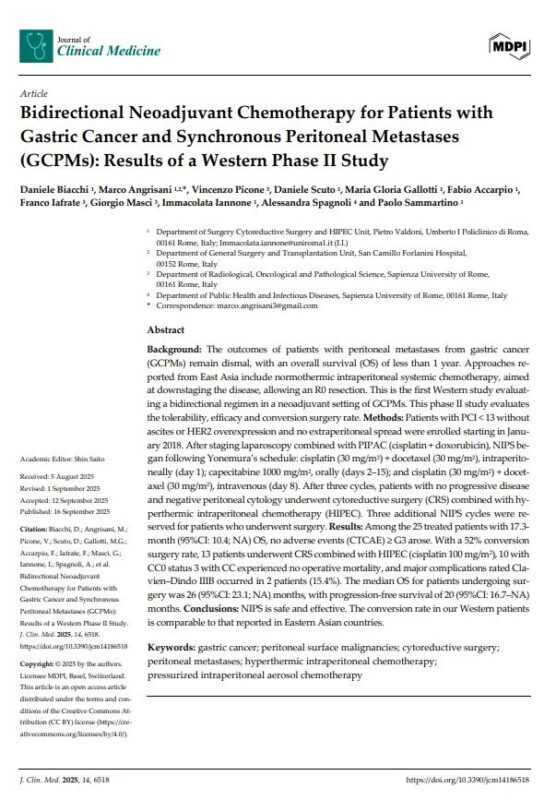
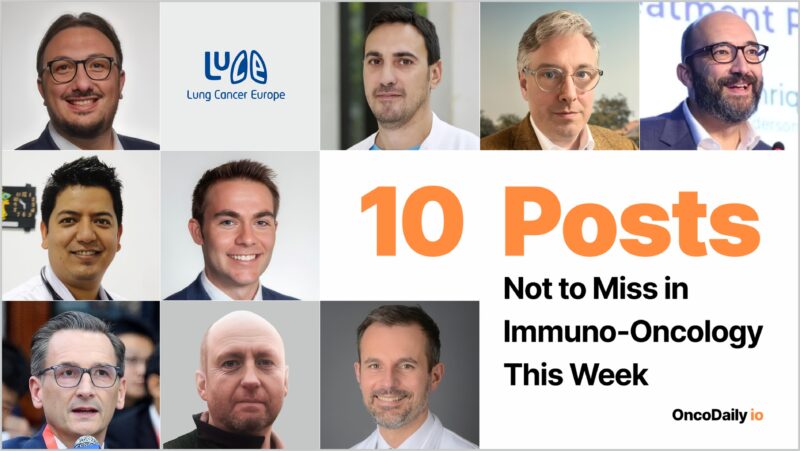
You can read 10 Must-Read Posts in Immuno-Oncology This Week on OncoDaily.


